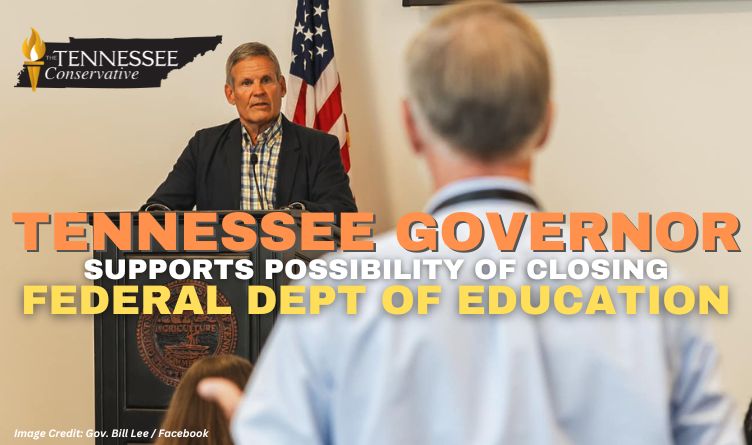Image Credit: Gov. Bill Lee / Facebook
The Tennessee Conservative [By Paula Gomes] –
Last week, Governor Bill Lee welcomed the possibility of the U.S. Department of Education closing when President-elect Donald Trump takes office for a second time. Lee told reporters that he believes states can do better when it comes to deciding how federal dollars should be spent on students.
President-elect Trump has yet to name his pick for U.S. secretary of education as he assembles his cabinet.
The Department of Education is the smallest of all Cabinet agencies, achieving that status by way of federal law under President Jimmy Carter in 1979, and is responsible for the distribution of federal financial aid for education.
The agency also collects and disseminates school related data and research, and protects students and teachers from discrimination in U.S. schools by requiring compliance with federal laws in exchange for funding.
The agency oversees U.S. colleges and universities, nearly all of which receive some kind of federal funding, and administers student aid through the Free Application for Federal Student Aid (FAFSA), as well as the federal Pell Grant for low-income college students.

Located in Washington, D.C., the agency has several thousand employees and regional offices around the U.S. and is tasked with writing regulations that help clarify and implement laws written by Congress such as ensuring that students with disabilities get an education.
With all the talk of federal dollars in education, K-12 schools around the country are already largely controlled through school boards at the state and local level. Most of the funding comes from allocations from state legislatures and local sources, such as property or sales taxes, with about a tenth of the money coming from federal funds.
No detailed plan has been put forward to date for shutting down the department, and its programs, but in order for that to happen, Congress must get involved. In order to permanently close the agency, President-elect Trump would probably require 60 Senate votes, requiring some Democratic lawmakers to also support the measure.
Should it become a reality, Lee envisions education funding being distributed to states in a manner similar to how Tennessee negotiated a Medicaid block grant waiver program the last time President Trump was in office. This arrangement gives the state more control over how it spends federal funds and according to Lee saves both the federal government and state citizens taxpayer money.
In Tennessee, about $1.8 billion is shared among local districts for its public schools, with most of the money supporting children from low-income families, English language learners and disabled students. According to Lee, this wouldn’t change should the state become responsible for determining how federal dollars should be spent.
It has been floated that enforcement of civil rights protections, currently the purview of the Department of Education, could switch over to the U.S. Department of Justice but Lee says that a complaint process would exist at the state level also.
Critics are leery of Tennessee’s commitment in caring for special student groups, with the Tennessee Disability Coalition giving the state a “D” on its annual performance scorecard.
Tennessee’s track record of educating students with significant needs has not been great, having once had laws even excluding children with disabilities from receiving a public school education. Only 1 in 5 special needs students before 1975 were educated in the state’s public schools before the passage of a federal law guaranteeing their right to an education.
Currently, around a tenth of all public school students in Tennessee use an individualized education plan (IEP). The intent of these plans is to make sure that a student is receiving necessary accommodations through specialized instruction and related services due to their disability.
The laws that protect students with disabilities aren’t going anywhere, even if the Department of Education should cease to exist. What remains unclear is how those laws would be enforced or how funding would work.
Last November, state lawmakers were in the middle of a series of committee meetings that reviewed Tennessee’s use of federal funding for K-12 education as they evaluated whether the state could reject billions of dollars of federal education dollars.
A legislative task force, the Joint Working Group on Federal Education Funding, spent months studying the feasibility of the state outright refusing all federal funding after House Speaker Cameron Sexton suggested that the state entertain the idea.
At the time, both Sexton and Lee had complained of federal strings and government overreach that came attached to federal dollars. Tennessee received $10.4 billion in federal funding between 2019 and 2023, with 142 school districts receiving between $314 and $2,500 per student.
The panel’s Senate and House members ultimately disagreed about how to proceed, issuing separate recommendations at the end of their investigation. The Senate report found the step of rejecting federal funding risky, while the House thought the state should explore taking incremental actions.

Sources:

About the Author: Paula Gomes is a Tennessee resident and reporter for The Tennessee Conservative. You can reach Paula at paula@tennesseeconservativenews.com.



3 Responses
I have been trying to educate people for years about the Federal Department of Education. Back in the 70’s we were NUMBER ONE in the world for education. THEN in 1979 Carter created the Federal Department of Education. Rather than being one little office in a bigger Agency, it now was a full blown Government bureaucracy. Since then we have slipped. The US ranks 12th out of 78 countries in education, despite being one of the most well-funded education systems globally. This also led to the ability to ban Religion in schools. While the so called “separation of church and state” could not be applied to Schools before the Federal Department of Education because it was a State level issue, it now became a federal issue and they could affect the schools with it.
What happened is this. The Feds collect taxes, then they sit there and say, if you don’t do this in the schools, you wont get your money. And for the last 45 years they have been busy destroying our education system. They also have conflated the College/University systems with PUBLIC SCHOOLS. Colleges and Universities are NOT public schools. They are mostly for profit businesses that deal in education.
The only loss will be some money from the Feds for schools. But isn’t the lottery and gambling revenues supposed to help pay for the Schools as well? I am not sure in Tennessee.
Well said “wlessard1”. We can only hope that Trump Admin. can pull this off. And, fortunately, Bill Lee supports it…he is correct! The states CAN distribute and initiate funds and run the state departments more effectively, efficiently and appropriately in accordance with their individual state issues. 7 Decades of the DOEd. and there have been ZERO upsides! But, I’ll ask…..what is the budget of the Federal Depatment of Education….can you imagine passing that entire budget along to the states. If I were the Trump Admin. that’s the first proposal I’d make….I’d bet it’ll change some minds…it certainly seems that our governor’s ‘Education Opportunity Act (for a select few) has won some support in its effort to give away more tax dollars and yet, still they’ll have some strings attached, but that’s an argument for another day. The ‘top down’ federal control of the educational agenda has been an unmitigated disaster, most of which is immoral, socialistic with a leftist bent……DEI, CRT and other immoral agendas are all ideas from bureaucrats in DC. Lets FIGHT to end the Dept. of Education and LIMIT the power of the Tennessee Dept. of Ed. also!
I’m with RINO Bill on this. Undo Carter’s damage.